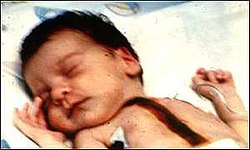IN MEMORIAM
 |
"Baby Fae," real name: "Stephanie Fae
Beauclair" shortly after her defective
heart was replaced by one transplanted
from a baboon. The dark stripe on her
torso is the enormous surgical incision. |
|---|
LOMA LINDA, California, November 16, 1984 (UPI) - "Baby Fae," the infant whose three-week battle to survive with the transplanted heart of a baboon enthralled the world, died at 9 p.m. PST, Thursday, November 15, at Loma Linda University Medical Center. The cause of death was heart and kidney failure, the latter caused in part by damage due to the anti-rejection drugs given to prevent rejection of the foreign heart. Memorial services were held Saturday at the Seventh Day Adventist University about 70 miles east of Los Angeles . . .
In the vast arena of human events, the life of any individual is rarely one that holds the attention of the world for very long, or matters but little in the overall destiny of mankind. True, there are exceptions. In our lifetimes there have been great people like Mohandas Ghandi, Werner Von Braun, Albert Einstein, Walt Disney, Jonas Salk and others, equally famous. Historians could give us the names of thousands of people who contributed in one great way or another to the world in which we live today, often in ways that those very people never dreamed of, or perhaps would have wanted, had they known.
But these same historians could not tell us who invented fire, or the wheel. They do not know the name of the first mathematician to count past ten, or the identify of even one of the starving savages, huddled together in the numbing cold of the last ice age, who became the ancestors of all living human beings. Human destiny is shaped not only by the great, but also by the humble. It is often profoundly influenced by a single individual who is but a helpless victim, whose contribution is not so much in what he does, but in what and where he is, often in a cruel and seemingly uncaring and uncompromising world.
Such was the life of Baby Fae.
Hers is, in fact, a very human story, filled with helplessness and hopelessness and misery! It was inextricably intermingled with that of her mother, a woman separated from the warm security of a husband's love and caught in the unimaginable terror of the certainty of her suffering child's imminent death! Theirs was a drama of overwhelming emotion, of superhuman heroism against impossible odds. It struck at the very fundamentals of what it means to be human, of the rights of all creatures, great and small, of the immeasurable worth of even a single human life, however young, and of the awesome, crushing responsibility assumed by anyone who would give or take away the life and future of any living thing.
Baby Fae would have been fourty years old this year, 2024. She was only 32 days old when she died, the victim of hypoplastic left heart
syndrome, a deformity that takes the lives of one-fourth of all infants who die within a week of their birth. She never had a birthday party or smelled a flower. She never played in the rain, or witnessed the beauty of a sunrise, or heard the song of a bird. She never loved a man or bore his children. But in the single month of her earthly existence she compressed a whole lifetime of service to her fellow man, for she gave us as no one before her a richer understanding of the life of the very young, and how, someday, many of those same lives may be saved.
Someday, medical science will surely find a way effectively to repair the deformity which ended Baby Fae's young life, and to permit transplants of organs from other animals into humans otherwise condemned by circumstances to early death. Even today, several alternate procedures are estimated to enable 70% of patients with Baby Bae's condition to reach adulthood. Children born with her abnormality now live on, to take their places along with the others, great and small, who will shape the future of our planet and our race. They will love and they will hate. They will be happy and they will be sad. They will sing and they will weep.
And ultimately, like Baby Fae, they will die.
But the years that are allotted to them, and to every one of their descendants, whoever and whatever they may come to be, will be due, in very large measure, to the very first of their kind -- to the unknown little baby girl with the heart of a baboon, known to the world and to history as, simply, "Baby Fae."
Good-by Baby Fae . . . and thank you.
John Lindorfer
